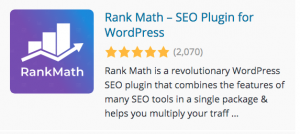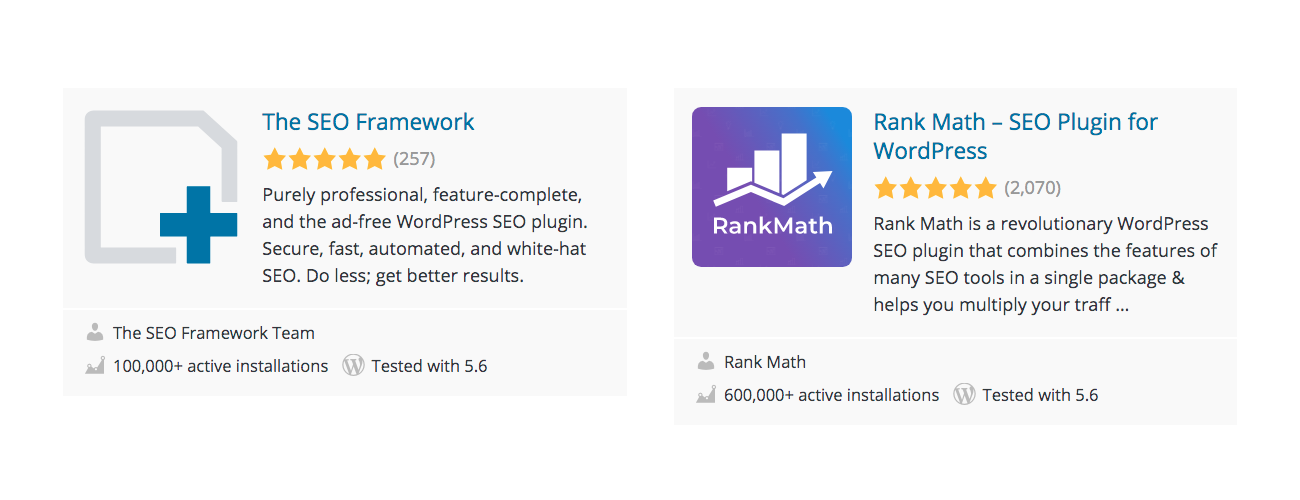Disclosure: This post contains affiliate links. I may receive compensation when you click on links to products in this post. For an explanation of my Advertising Policy, visit this page. Thanks for reading!
Rank Math vs Seo Framework, Seo Optimization heats up.
Rank Math has gotten a lot of press over the past year or so. It seems to have taken the SEO plugin world by storm on WordPress.
When you dive deeper and compare Rank Math vs The SEO Framework some of the dust begins to settle.
However, please be sure to read till the end to find out which SEO plugin I ended up going with. The conclusion may surprise you. It did me.
| How do they match up? |  |
 |
| SEO Metrics. | Rank Math has a lot of neat features especially for those who are looking for all kinds of metrics in order to help evaluate and analyze their SEO on their WordPress site. | SEO Framework’s features aren’t as comprehensive as Rank Math’s that’s for sure. But, it’s uncomplicated interface and streamlined dashboard gives you just the bare essentials without the bloat. Very beginner friendly. |
| DISC space and resource usage. | The SEO Framework is more lightweight than Rank Math as Rank Math seems to put a lot of bloat on your website which can slow it down. Whereas, The SEO Framework is designed to be lightweight. That’s why developers love it.
In fact, it seems like The SEO Framework is the preferred SEO plugin for developers because it’s code is cleaner and more lightweight. The SEO Framework also hasn’t had a security problem in over 4 years. The SEO Framework is a barebones SEO plugin similar to All-In-One SEO. However, The SEO Framework is cleaner and easier to use and seems a little more optimized for SEO than the all-in-one SEO plugin. To be honest, although All-In-One SEO is lightweight it’s interface looks a little outdated. |
|
| Settings and Set up. | Rank Math although it has a lot of neat features that everyone and who claims to be an SEO expert is looking for.
Those in SEO are always looking for that slight edge in order to inch their post up in the Google Rankings. With all the features that Rank Math has, it’s no wonder why many seem to be raving about it. That is until they start really poking around the hood, trying to make sense of all the metrics, compatibility issues with other plugins, then trying to get help from Rank Math’s support However, the thing about SEO tools is no SEO tool is, no tool is going to give you the whole picture. In fact, many of them are quite off in their traffic estimates as well as their competition analysis, which is the heart of SEO. |
The SEO Framework is quite easy to set up, especially for beginners. All its settings are nicely organized and it’s pretty easy to find out how to use its features.
Which is really handy if you’re not an SEO expert. The SEO Framework also has excellent support, even for their free plugin. |
| User friendly? | Rank Math’s Pro version seems to be quite clunky as well. Their customer service seems more defensive than problem solving. Rank Math no doubt has a lot of features in their plugin.
In fact, some of the settings can be overwhelming, especially for the inexperienced. |
Because SEO Framework’s interface is more lightweight and seems bare bones, its settings are much easier to configure. Their support focusses on solving problems more than giving excuses. |
| Compatibility. Does it play nice with other plugins? | As far as compatibility with SCHEMA Pro plugin, Rank Math has had some issues.
Normally some SEO plugins contain their own SCHEMA like you see on The SEO Framework as well as Rank Math. SCHEMA Pro has had issues with Rank Math. Although Rank Math does have its own SCHEMA and many people are quite satisfied with the SCHEMA support they get from Rank Math. However, in order to use SCHEMA Pro, you must first disable the Rich Snippets module in the Rank Math plugin. Although, some have complained that even after disabling the Rich Snippets plugin in Rank Math, they are still having compatibility issues. Though it must be said that Rank Math does have its own built-in schema rich snippets module which many seem quite satisfied with and don’t feel the need to download the SCHEMA Pro plugin. |
If you would like to use the SCHEMA Pro plugin, which is quite popular and it seems to work fine with Yoast as well as The SEO Framework. |
| Coding and RIPS Scores.
Of course the lower the rips code risk score the better. To read more about how RIPS scores test PHP vulnerabilities and how they can affect WordPress sites check out this article, “TAP: A static analysis model for PHP vulnerabilities based on token and deep learning technology.” To learn more about RIPS scores and how your WordPress site and plugins coding measures up, visit the RIPSTECH website. |
As far as coding goes and risks and bulbs there’s a rips code risk score and interesting to note that Rank Math has more than 96,000 lines of code and a rips code risk score of 10 | The SEO Framework has 36,000 lines of code but a rips code risk of zero. |
| Reviews.
When looking over the WordPress plugins descriptions I found that the percentage of one star reviews to five-star reviews. This is when I took the amount of one star reviews and divided them up by the five star reviews. |
Rank Math had 44, 1 star reviews and 1,973 five-star reviews which equalled .022. | The SEO Framework had 2, one-star reviews and 247 five-star reviews, which equalled .008 |
| Downloads and Updates. | Rank Math is much more popular for downloads with over 600,000 active insulations.
Keeps it plugin up to date regularly. |
The SEO Framework with over 100,000 inactive installations.
Keeps it plugin up to date regularly. |
| Installation. | You install Rank Math just as you would any other WordPress SEO plugin.
Simply download the plugin from your plugins area on your WordPress dashboard, activate it and follow the instructions which for Rank Math are quite numerous. There is certainly a learning curve with Rank Maths since they have so many features. You could spend days learning them all and how to use them. If you’re an analytics geek and you really like to dive into the minutia of analytics, then Rank Math is certainly for you. In fact, Rank Math’s free version has so many features and metrics, it makes you really wonder why they’re not charging for them. Although they do have a Pro version, 80% of what most website owners need they can get in their free version. Which again, makes you wonder why they are giving so much functionality away for free? Many think it’s because they are more interested in data harvesting than they are in collecting subscriptions for their product. But, that’s just speculation. If that’s the case though Rank Math should be open about it. But then again, is Facebook or Google really open about their data harvesting to users? |
Downloading The SEO Framework WordPress plugin, like with Rank Math, you simply download it from your WordPress plugin’s section in your dashboard under “add new plugin” and activate it as well.
When tinkering around The SEO Framework’s interface as far as usability is concerned, there’s a much lower learning curve and the plugin seems to be more streamlined, just giving you the very essentials. |
Rank Math vs Seo Framework conclusions.
Personally, I got tired of Yoast SEO and their stupid green, yellow and red lights. I’ve had posts getting hundreds of users a day that Yoast SEO put as red.
I just got tired not only of Yoast’s outdated and really irrelevant metrics, but the bloat on my site as well.
I had to switch back and forth from All-In-One SEO to Yoast and back again. Unfortunately, All-In-One SEO although it’s lightweight, It’s just too outdated in it’s interface.
On the other hand, I wasn’t quite ready to make the jump into Rank Math and join that bandwagon without doing a little research.
So when I was looking into changing my SEO plugin from Yoast, I found more and more about The SEO Framework, over surprisingly, Rank Math, which I preferred.

I liked the fact that I can actually use a separate SCHEMA plugin like the Schema – All In One Schema Rich Snippets, or it paid version the SCHEMA Pro if I wanted to add that functionality to my site.
Whereas, with Rank Math SCHEMA plugins seem to have compatibility issues. After reading reviews and going into the support of both The SEO Framework and Rank Math it seems like the Rank Math staff had more of a defensive tone than of being helpful.
However, The SEO Framework support seems to actually give answers and be, well, more supportive of their users and not on the defensive.
The SEO Framework gave clear and justifiable answers for why their plugin does or does not do certain functions which I appreciate.
I was really hoping that when I heard about Rank Math and all the talk about their SEO plugin in the SEO community, that I had finally found the Holy Grail of SEO plugins.
But it seems that many of the positive reports by some well known SEO “Gurus” in the community have been way over blown when you dive deeper into actual user reviews and forums.
So in the Rank Math vs SEO Framework battle, for me SEO Framework wins due to its simplicity, lack of bloat and clean coding.
I find as a non-developer who runs several websites that SEO Framework allows me to focus more on content without having to worry about ticking all the metrics boxes for so-called SEO criteria.
However, if you don’t mind giving up some of your website’s data and are an analytics geek, Rank Math is for you, without a doubt. Although the Rank Math does have a learning curve, you will not find an SEO plugin with as many features, functionality and metrics in a free version as you will with Rank Math.
For me the clear winner in the Rank Math vs SEO Framework to replace Yoast SEO is The SEO Framework. What about you?
Although in the end, I actually went with SEOPress! But that write up is for another day)



